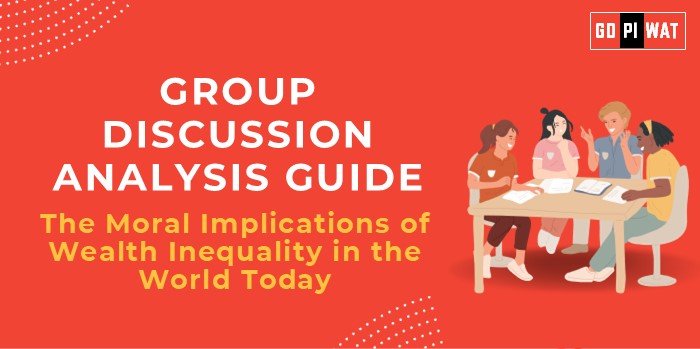📋 Group Discussion (GD) Analysis Guide: The Moral Implications of Wealth Inequality in the World Today
🌐 Introduction to the Topic
Opening Context: Wealth inequality, often considered one of the greatest moral dilemmas of our age, continues to widen, with the top 1% controlling more than 40% of global wealth. This disparity not only raises ethical concerns but also poses social and economic challenges.
Topic Background: The roots of wealth inequality can be traced to systemic economic structures, globalization, and technological shifts. Recent developments, such as the COVID-19 pandemic, have exacerbated disparities, making this issue a focal point for moral, economic, and political discourse.
📊 Quick Facts and Key Statistics
- 🌍 Global Wealth Concentration: The top 1% controls over 40% of global wealth, while the bottom 50% owns less than 2% (Oxfam, 2023).
- 💰 Income Gap: In 2023, CEOs earned 320 times more than the average worker in the U.S. (Economic Policy Institute).
- 🌐 Extreme Poverty: Nearly 700 million people live on less than $1.90 per day (World Bank, 2023).
- 📈 Wealth Growth: Billionaire wealth grew by 70% during the pandemic years, highlighting systemic inequities (Credit Suisse, 2023).
👥 Stakeholders and Their Roles
- 🏛️ Governments: Enforce policies to redistribute wealth through taxation and social programs.
- 🏢 Corporations: Responsible for fair wages, corporate social responsibility, and ethical practices.
- 📣 Civil Society: Advocates for equity through activism and policy recommendations.
- 🌍 International Organizations: Address cross-border inequities and promote global fairness.
🏆 Achievements and Challenges
✨ Achievements:
- 📊 Progressive Taxation: Nations like Norway and Sweden have narrowed wealth gaps through high-income taxation.
- 🩺 Social Welfare Programs: Universal basic income experiments in Finland have shown promise in reducing poverty.
- 📈 Corporate Initiatives: Some companies have adopted equitable pay structures to reduce internal disparities.
⚠️ Challenges:
- 🔒 Tax Avoidance: Wealthy individuals and corporations exploit loopholes to evade taxes.
- 🌍 Global Disparities: Developing nations struggle with systemic inequities, exacerbated by colonial legacies.
- 🤖 Technological Disruption: Automation disproportionately affects low-income workers, widening the wealth gap.
🌐 Global Comparisons:
- 🇺🇸 United States: Extreme wealth concentration and systemic inequality.
- 🇳🇴 Nordic Countries: Exemplars of wealth redistribution through social welfare.
💬 Structured Arguments for Discussion
- ✔️ Supporting Stance: “Wealth inequality undermines societal harmony and violates the moral principle of fairness.”
- ❌ Opposing Stance: “Inequality is inevitable in a merit-based economy and can incentivize innovation and growth.”
- ⚖️ Balanced Perspective: “While some degree of inequality drives progress, unchecked disparities threaten social stability.”
🛠️ Effective Discussion Approaches
- 🎯 Opening Approaches:
- 📊 “With the top 1% owning 40% of global wealth, we must examine the moral justification of such disparities.”
- 📖 “Norway’s model of wealth redistribution provides valuable insights into reducing inequality.”
- 🔄 Counter-Argument Handling:
- Acknowledge opposing views but emphasize systemic solutions.
- Highlight success stories that refute extreme arguments, such as equitable economic models in Nordic countries.
🔍 Strategic Analysis of Strengths and Weaknesses
- 💪 Strengths: Creates awareness; motivates collective action.
- ⚡ Weaknesses: Resistance from powerful elites; implementation challenges.
- 🌟 Opportunities: Global collaboration; tech-driven solutions.
- ⚔️ Threats: Political polarization; economic instability.
📚 Connecting with B-School Applications
- 🌍 Real-World Applications: Link wealth inequality to sustainable business models, CSR, and impact investing.
- ❓ Sample Interview Questions:
- “How can businesses ethically address wealth inequality?”
- “What lessons can developing nations learn from Nordic redistribution policies?”
- 💡 Insights for B-School Students:
- Understand how wealth inequality influences market dynamics.
- Explore ethical leadership and inclusive growth models.


